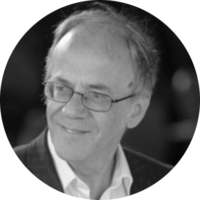Christianity has plenty to say about the future and what the world’s end might look like — though some think it says a lot more than others. Christians have, in fact, been accused of being obsessed with end times, so much so that they stop caring about the world they’re in right now. And sometimes that’s true.
But apocalyptic Christians aren’t the only ones dwelling on all this. Plenty of us are more interested than ever – especially this year! – in how the world will end. The stories we tell ourselves in culture are becoming increasingly apocalyptic.
Why is that?
This episode is brought to you by our season sponsor Zondervan Academic, publishers of the Collected Essays of N.T. Wright.
LINKS
- Have a read through The Book of Revelation.
- Watch Australia’s Secretary for Home Affairs, Michael Pezzullo’s, full speech on ‘Securing Australia’ here.
- Get to know our guest, Alissa Wilkinson from Vox
- And read Alissa’s book How to Survive the Apocalypse: Zombies, Cylons, Faith, Politics and the End of the World
- Pssst… here’s an except of the book, a chapter on ‘The Myth of the Secular Apocalypse
- Get to know our guest, Professor Richard Bauckham, one of our greatest living theologians.
- Professor Bauckham has written many, many books. But since our discussion revolved around the Book of Revelation, you should check out his book on that subject, The Theology of the Book of Revelation
- Here’s the 2010 New York Times article Alissa mentions by Chuck Klosterman, My Zombie, Myself: Why modern life feels rather undead.
- For a more in-your-face example of how pop culture continues to use biblical imagery from The Book of Revelation, just watch the trailer for the 2016 blockbuster, X-Men.
- The film’s director Bryan Singer told the LA Times that Apocalypse – an immensely powerful and ancient mutant – views himself not as a mutant but as a god. Singer says, quote “For all intents and purposes, he is potentially the God of the Old Testament. After being buried for 4,000 years, he awakens to a society that has become interconnected and developed hubris. Humans have created nuclear weapons and assumed godlike proportions in the buildings they build and the things they create. So he sets about to eradicate those things and build what he considers a cleaner, purer world.”
- Check out Alissa’s Syllabus for the End of the World – her list of stories that tell us how to live during -and after – a pandemic.
- Here’s the Al Jazeera tape of Harold Camping’s apocalypse prediction in 2011
- Here’s the Left Behind book series… but John reckons you should skip it. Read C.S. Lewis’ Narnia Series instead.
- More on the US National Evangelical Leaders survey of 2011, which found that 65 per cent of evangelical church leaders in the US identify with premillennial theology, which grounds this rapture idea.
- Watch REM’s Michael Stipe’s full Coronavirus message.
- More on the Macquarie Dictionary’s Word of 2020, “Doomscrolling”
- John quotes from the pseudepigraphal work (not in any biblical canon) Psalms of Solomon in this episode’s 5 Minute Jesus. Read more about them here.
Movies and TV referenced in this episode
- Game of Thrones
- The Walking Dead
- Cormac McCarthy’s novel, The Road, and the “very fine” movie.
- Wagner’s Ring Cycle
- The Hunger Games
EXTRAS
Here’s John Dickson and Professor Bauckham’s discussion on ‘the Millennium’ in the Book of Revelation. PRESS PLAY HERE.
WIN!
We’re giving away 20 copies of John’s book, 666 And All That: The Truth about the End Times, which he co-wrote with Dr Greg Clarke. If you’d like to win a copy, you just need to be one of the first 20 new subscribers to the Undeceptions e-newsletter. So quick! Scroll down to the bottom of this page and subscribe now. We’ll be in touch with the winners in the first week of January.world’s end world’s end
Meet our guests

Richard Bauckham was until 2007 Professor of New Testament Studies and Bishop Wardlaw Professor in the University of St Andrews, Scotland, and is now Professor Emeritus at St Andrews. He was born in London in 1946, and educated at Downhills and Merryhills primary schools and Enfield Grammar School. He then studied at Cambridge, where he read history at Clare College (gaining a B.A. Honours degree, first class, and a Ph.D.), and was a Fellow of St John’s College for three years. After teaching theology for one year at the University of Leeds, he taught historical and contemporary theology for fifteen years at the University of Manchester, before moving to St Andrews in 1992. He is a Fellow of the British Academy and a Fellow of the Royal Society of Edinburgh. He retired in 2007 in order to concentrate on research and writing, and is Senior Scholar at Ridley Hall, Cambridge, where he does some teaching for the Cambridge Federation of Theological Colleges.

Alissa Wilkinson is an associate professor of English and humanities at the King’s College in New York City, where she has taught criticism, cinema studies, and cultural theory since 2009. Her book Salty: Lessons on Eating, Drinking, and Living from Revolutionary Women (Broadleaf) was released in June 2022, and she’s currently writing her next book, We Tell Ourselves Stories (Liveright). She is also the co-author, with Robert Joustra, of How to Survive the Apocalypse: Zombies, Cylons, Faith, and Politics at the End of the World (Eerdmans, 2016). Alissa holds an MA in humanities and social thought from New York University and an MFA in creative nonfiction writing from Seattle Pacific University. Before joining Vox in 2006, she was the chief film critic at Christianity Today.
Want to send John Dickson a question? He loves them. Just click here to provide a query for our next Q and A show!
Undeceptions is part of the Eternity Podcast Network, an audio collection showcasing the seriously good news of faith today.











































